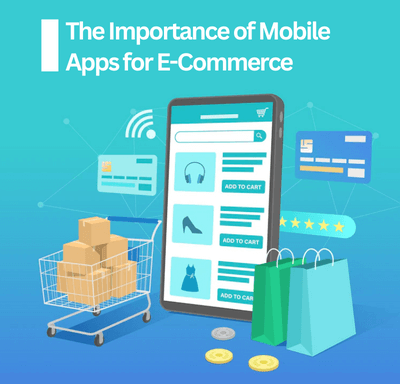
About us
Our Services
Our Expertise
Our Experience
Follow us
Why e2logy?
- We strive to provide superior customer service and ensure that every client is completely satisfied with our work.
- Our engineers are trustworthy, dedicated, and experienced and will go the extra mile to solve your IT issues.
- We are committed to delivering outstanding, cutting-edge IT solutions that add real value that goes beyond what is expected.

The Importance of Mobile Apps for E-Commerce

Online shopping has grown at a blistering pace in recent years. E-commerce sites are being visited and purchases are being made using smartphones. Despite this, incumbent players face too much competition. To increase their reach to their audiences, they must come up with new strategies. The development of mobile apps for eCommerce is one way to strengthen outreach.
These findings have also been backed up by studies. A significant increase has been observed in mobile commerce demand. The user experience may not be improved simply by using a responsive eCommerce site. Mobile apps are preferred by the audience because they are more convenient. Mobile apps have several benefits for eCommerce, which will be discussed in this article.
The Importance of Mobile Apps for E-Commerce
There is rapid growth in mobile commerce these days. A mobile eCommerce solution is essential to building a successful trading enterprise and increasing sales while attracting customers. Mobile solutions are important for your webshop for a variety of reasons. In this article, we’ve outlined the most important eCommerce app benefits for businesses.
1. Conversion rate improvement
E-commerce applications on mobile devices have higher conversion rates than websites on mobile devices. The convenience and user-friendliness of mobile apps allow people to make purchases in minutes. Customers are more likely to purchase when they have this seamless experience.
By integrating push notifications, wish lists, product filtering, and sorting, customers can enjoy a seamless shopping experience. Further, mobile apps let you save all your payments and personal information to make checkout easier. Customers can enjoy a more convenient shopping experience with these features in mobile eCommerce apps.
You should implement split testing and production testing during the development process if you want your e-commerce mobile app to be highly effective. This will let you know if your app has any user experience problems, so you can fix them before potential users become discouraged.
2. A better experience for customers
Millennials expect brands to deliver a consistent and personalized experience throughout their journeys. You will not be able to achieve this by only using websites to communicate with your consumers. Making mobile apps easy to use will make your customers more likely to be repetitive.
By combining emerging technologies with mobile eCommerce apps such as Machine Learning, Artificial Intelligence, AR & VR, you will get valuable insights about your customers, such as:
- How do your customers feel about your product?
- When is the best time for them to buy online?
- When they make a purchase decision, how long does it take them?
You will be able to offer your customers an optimized shopping experience once you receive the answers to all such questions.
3. Make shopping more personalized
The success of eCommerce depends on personalization. Personalized eCommerce tactics might already be used by some of you.
For example, you might group your customers according to their location, age, or gender when they sign up for emails from your company. If you want to improve their experience, you can send them targeted emails.
You can also customize your homepage based on where a user is located when they visit your website.
Many eCommerce websites utilize these tactics as part of their marketing strategy.
Personalization is taken to a whole new level with eCommerce mobile apps. An app can provide personalized recommendations based on browsing and purchase histories.
The same thing can be done through a website, but the customer must always be logged in, so an app makes things simpler.
This personalization strategy can be used in conjunction with your push notification campaigns as we discussed earlier. You can send targeted notifications based on the preferences of your m-commerce users instead of sending the same push notification to everyone.
Through an app, a customer can access all their past purchases, which makes it easy for them to reorder products they’ve gotten in the past.
4. Increased efficiency and revenue
It is generally assumed that mobile applications are more flexible and user-friendly than desktop applications. Likely, their implementation will quickly pay off and increase sales, despite the fact they are quite expensive. There is a direct correlation between a good app with the right concept and functionality and increased clientage, which in turn leads to increased orders, which leads to greater earnings.
A push notification channel is also an effective tool for increasing sales and maintaining brand recognition. When you send push notifications to your customers, you can instantly provide them with crucial information and inspire them to make an immediate purchase.
5. Enhancing marketing communications
Mobile apps are more easily accessed these days through push notifications than websites. Users click on push notifications 60 times more often than emails, according to research. Essentially, your e-commerce app is easier to direct consumers to when you push notifications, so a big chunk of your marketing budget goes to push notifications. The user just clicks on the push notification and is taken directly to the mobile app when it appears on their home screen. Emails are not like this. Promotional emails are often not even read by users. Money spent on marketing is just wasted.
6. Utilizing your phone’s built-in features
In addition to the engagement of the phone’s inherent features, mobile applications also take advantage of the phone’s connectivity. In many mobile applications, users can pinpoint their location by using GPS, telling a microphone what they are looking for, or otherwise verbalizing their search. Mobile apps will then be more usable by increasing their usability quotient.
Android and iOS operating systems both have examples of this functionality, such as Siri on iOS devices and ‘Ok Google’ on Android smartphones. Our mobile devices are already engaging, but there are still some in-built features that make them even more so.
7. Various payment methods
Despite the convenience of online payment options offered by websites, mobile applications go even further. Third-party payment apps such as Google Pay and Apple Pay enable customers to pay by tapping a button. Payments can also be made online with their regular debit cards, Ewallets, or PayPal accounts.
Customers don’t have to go through the process of entering payment details every time they checkout when using a mobile app, which makes shopping online super convenient. As a result, they don’t have to carry around their laptops when shopping from anywhere on the go.
Your first step should be to choose a third-party payment gateway that is compatible with your current integrations for your online store. Your brand should keep up with the demand by offering several reliable, safe, and secure payment methods. EWallets are on the rise these days, so you should be able to keep up with them.
Final Words
You should take advantage of every opportunity you have to make your eCommerce store successful. With all the benefits above in mind, you can make an informed decision about whether to create your eCommerce mobile app.
With E2logy, you will get the fastest mobile app eCommerce and save investing costs, which leads to success in your business when you wish to have your mobile app eCommerce or to apply mCommerce to your business activities.













